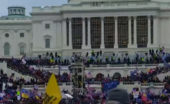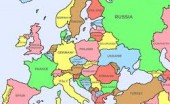Re The UN General Assembly Speaker Schedule is Here! I note that whoever will be speaking for Canada this year…
Wednesday Night #1901
Written by Diana Thebaud Nicholson // August 15, 2018 // Wednesday Nights // Comments Off on Wednesday Night #1901
As we enter the 20th century of Wednesday Nights, and prepare for Peter Berezin’s return on Wednesday, August 22nd, we offer these gleanings as items for reflection and debate.
Although not noticeably applicable to Wednesday Night sessions, first on our list is the CBC interview We need a survival guide for thinking because we’re bad at it with Alan Jacobs, a professor at Baylor University and author of How to Think: A Survival Guide for a World at Odds, (Yes, we have ordered the book.) This is a thoughtful examination of our need for dialogue in order to think. He also posits that the human desire to belong is so strong that it actually hinders our ability to think freely and critically.
“If the thinking comes in the way of that belonging then we’re not going to think,” he argues – a phenomenon you can see that play out on social media.”
We particularly like his suggestion that “Instead of trying to think on your own (you’ll fail anyway because we’re not wired to think in isolation, according to Jacobs), find people to think with. He suggests looking for people who are like-hearted, not necessarily like-minded – people who you don’t always agree with but [who] hold the same virtues like generosity, charity, and honesty.”
For those of us who have been following the fate of statues of controversial historic figures– the most recent case being the removal from Victoria City Hall of the statue of Sir John A. Macdonald, Professor and writer Matthew A. Sears explains in a series of articulate tweets why monuments are not equal to museums.
“Far from preserving history, monuments are often the worst culprits in propagating a distorted and ideological version of ‘history’ that does more to erase history than anything else,” he writes.
August 15 is the 71st anniversary of India’s Independence.C Uday Bhaskar reflects that “Citizenship in India is no longer equal and the law, alas, is not applied equitably. On its 71st independence anniversary one cannot ignore the conjecture that India, which had determinedly rejected the two-nation theory in August 1947, is now moving towards it in a visible manner.”
The debate about Canada v. KSA continues. You may have noted that John Baird weighed in on Saudi state-owned Al Arabiya suggesting that Trudeau should fly to Riyadh to apologize in person. Of course, the fact that Baird now works at a series of consultancy roles, including a position on the advisory board for Barrick, a major mining firm with interests in Saudi Arabia has nothing to do with this very public intervention. In contrast, we recommend the thoughtful opinion piece in the NYT Is Saudi Arabia Really So Angry at Canada Over a Tweet? by Ali Shihabi, founder of the Arabia Foundation think tank and Irwin Cotler’s What Canada should do about Saudi Arabia; also not-to-be-missed is John Ibbitson’s sensible It’s time for the Trudeau government to move past its errors and post some wins in foreign policy “People in the Prime Minister’s office appear to be receiving bad advice from officials at Global Affairs, or ignoring good advice – the latter seems more likely – leading to gaffes and embarrassments.”
Andrew Cohen’s piece for Open Canada In Maine and Eastern Canada, unintended consequences of Trump’s trade war on display highlights a little-discussed aspect of the tariff wars. He notes that “The lobster industry in the US is feeling the tariff pinch, but America’s loss is Canada’s gain”. However, “much as Canada has an opportunity to build on its success of recent years, there are structural challenges. The reason that two-thirds of Canada’s lobster exports go to the US is that Canada has fewer plants and transport capacity to process and ship its lobsters to distant markets. So if sales fall off dramatically in the US and the Canadian market is flooded, Canada may suffer, too.”
Jeremy Kinsman and Larry Haas examine the effects on Canada of the steel tariffs and a somewhat related matter: the impending crisis in Turkey. Jeremy comments: “It’s always “Trump versus” as a headline, isn’t it? But he seems to bring a fight to every relationship, with exceptions (Putin, and Kim Jung Un, though both will now fade in favour); how does he figure this works for the USA? He really only cares if it works for his base. But as Larry says, it isn’t working so well. As for Erdogan, he’s created his own problems, which now the world gets to share.”
Canadian grasslands is Céline Cooper‘s analysis for Chatham House on the fed-prov problems arising from the Trudeau government’s move to legalize marijuana. Her conclusion: “With confrontation almost inevitable between national and provincial authorities, the relaxation of the cannabis laws appears to be fraught with tension, not something that will necessarily appeal to those who prefer to chill.”
As the Paul Manafort trial draws to a close we recommend The Atlantic’s searing examination of America’s very serious kleptocracy problem “over the past three decades …America has become the sanctuary of choice for laundered money, a bastion of shell companies and anonymously purchased real estate. American elites have learned to plant money offshore with acumen that comes close to matching their crooked counterparts’ abroad.”
This week’s topic for David Jones and David Kilgour is the influence of the media, with the former arguing that Deference to Media [Is] Waning Around the World, while David Kilgour focuses on threats to freedom of the press in Media Key to Good Governance, But Press Freedom Diminishing Worldwide
Anatole Kaletsky: Trump’s Victorious Retreats
(Project Syndicate) Why does Trump keep making empty threats? His detractors respond that he is simply a braggart, a fool, and an ignoramus. But there could be a less unflattering, though equally depressing, explanation.
Trump’s approach to foreign policy is the opposite of President Theodore Roosevelt’s famous early-twentieth-century dictum: “Speak softly and carry a big stick.” Trump’s modus operandi could be described instead as, “Shout loudly and carry a white flag.” And while this sounds irresponsible and cowardly, it may be the most politically effective and rational strategy for conducting US foreign policy in the twenty-first century.
If we acknowledge that the United States is now a global hegemon in decline, it is reasonable for US voters to reject any serious economic or military sacrifices in pursuit of unattainable foreign policy objectives such as containment of China. And if Americans are no longer prepared to bear the costs of global domination, then disguised retreat is a better policy than the neo-conservative belligerence that produced the disasters in Iraq and Afghanistan, or the liberal interventionism that encouraged the Arab Spring and caused the disasters in Syria and Libya.
Trump’s skill at turning US retreats into personal political victories was on display in his dealings with North Korea and his acquiescence to Russian dominance in Syria. A similar policy should probably be expected vis-à-vis China and possibly Iran and Ukraine, because it reflects geopolitical and economic realities – and, more important for Trump, it enhances his personal position.
In our preoccupation with KSA, Trump tariffs, etc. we have neglected Brexit and overlooked rising unease about Jeremy Corbyn, including this archived piece in The Atlantic Why the Rise of Corbyn’s Labour Party Should Worry the West. For another view of Corbyn, see Corbyn’s portents for Israel by Caroline Glick, a senior columnist at Breitbart News and the senior contributing and chief columnist for The Jerusalem Post – hardly an independent observer.
The example is Australian, but the topic is universal:
How Globalization Has Broken the Chain of Responsibility
In today’s accelerating and overheating world, the gap between the people affected by change in local environments and the people in charge is growing ever wider
In the mid-1800s, when Karl Marx and Friedrich Engels wrote The Communist Manifesto, capitalists were easily identifiable. They were typically men, and the property owner was the proverbial man in the top hat, with his waistcoat, paunch, cigar, and gold watch. Today, the situation is far more complicated since ownership structures are transnational, corporate, and complex. Even in democratic countries, where political leaders are elected, there is a widespread feeling that the “powers that be” are further away and less approachable than before, and that there is nowhere to go with your complaints. In other words, both the economy and politics are less manageable, more difficult to understand, and harder to effectively react to.
There are alternatives to the current situation of powerlessness. One way to counter globalized power is to globalize the response by forging alliances between local community groups and transnational organizations that are capable of putting pressure on governments, public opinion, and corporations.
At the other end of our spectrum is the recent Washington Post examination of QAnon While most of us have been paying attention to trade & tariffs, Brexit, KSA vs Canada, etc., QAnon has been spreading.
“The storm QAnon truthers predict will never strike because the conspiracy that obsesses them doesn’t exist. But while they wait for it, they’ll try to whip up the winds, and the rest of us will struggle to find shelter. QAnon is scary because it’s getting bigger, it’s scary because we don’t know how to stop it, and it’s scary because the people behind it won’t be stopped, and, until their illusory storm arrives, they won’t be satisfied.”
With not much to cheer about on earth, we have to turn to space for a happy note o which to end – the successful launch of the The Parker Solar Probe – such an incredible undertaking!



